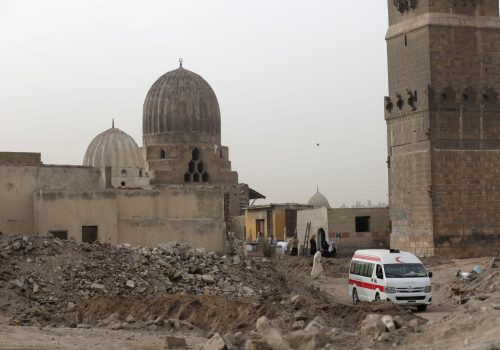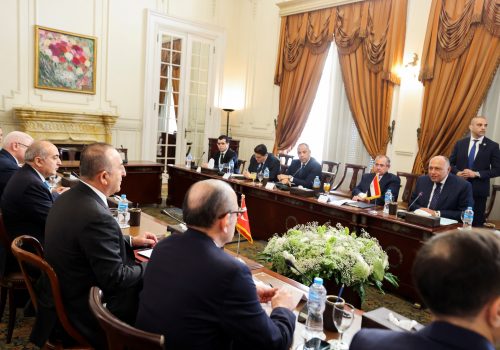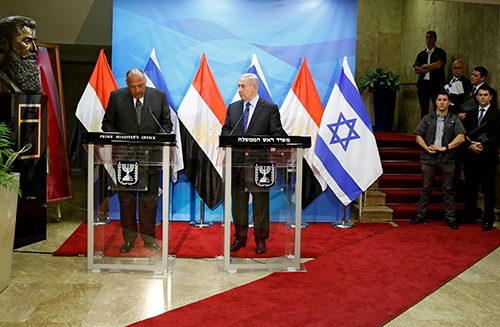Menendez’s case coverage is relatively muted in Egypt. That might be intentional.
The September 22 corruption indictment of Senator Bob Menendez (D-NJ) in a sweeping bribery case—allegedly involving the Egyptian government— has caused uproar in the United States, forcing him to step down as chairman of the Senate Foreign Relations Committee hours after the news broke. At the same time, the US mainstream media continues to aggressively cover the unfolding developments of the case.
This is in sharp contrast to Egypt, where reactions to the bribery accusations leveled at the Egyptian leadership have been largely subdued. Egypt’s predominantly pro-government media has chosen to either dismiss altogether or downplay the allegations. This comes as no surprise in a country where the state largely controls the media. Most Egyptian journalists do not dare question nor uncover the corruption within higher power echelons. Doing so would put journalists at risk of earning the wrath of the authoritarian regime.
Tens of journalists languish behind bars for far smaller “crimes,” such as publishing posts that are critical of the government on their social media platforms or expressing alternative viewpoints that run counter to views accepted by the mainstream. The situation has become even more restrictive with Egypt’s 2024 presidential election scheduled for December 10-12. Recently, Ahmed Bendary, the Head of the Egyptian Elections Authority, warned that those who doubt the upcoming elections’ integrity will be punished.
That is precisely why there’s been a near-total blackout in Egypt on the Menendez case, in which US federal prosecutors are probing the possible involvement of high-ranking officials from within the country’s intelligence services. Coverage of the case has been restricted to a news show broadcast on the state-owned “Al Qahera News Channel.” On September 23, the show’s presenter stated that Reuters had alleged that Senator Menendez and his wife were being accused of receiving bribes from three New Jersey businessmen to enrich the latter and benefit Egypt.
Not only did the news anchor avoid any mention of the alleged involvement of the Egyptian leadership in the bribery case, but she also failed to make any reference to the fact that one of the businessmen, Wael Hana—a co-defendant in the case—was an Egyptian-American Coptic Christian with a lucrative monopoly over the certification of halal meat—imported by Egypt from the US—granted to him by the Egyptian authorities.
Meanwhile, Ramy Gabr, Al Qahera’s correspondent in Washington, downplayed the bribery allegations, portraying them as part of the power struggle between Democrats and Republicans ahead of US Congressional elections. Gabr asked Joel Rubin, the former Deputy Assistant US Secretary of House Affairs for the State Department, about the rivalry ahead of the US Congressional elections and whether Rubin saw a connection between the elections and the Menendez corruption case. By focusing on the elections rather than the case itself, Gabr tactically steered the conversation away from Egypt and the US prosecutors’ accusations of bribery.
Rubin replied, “Right now, we are in the silly season in the United States with electoral campaigns underway in full throttle; anything can happen in US politics.” He went on to explain that it was a tight race and added that, with US presidential elections due next year, failure by the Democrats to garner majority seats in the Senate would have catastrophic implications for them. As a result, Republicans were stopping at nothing in their quest to attain power, Rubin added.
Egyptian analysts interviewed by the Middle East News Agency (MENA) also dismissed the case as “a US internal political matter” and “part of the wider power struggle between Democrats and Republicans ahead of the US presidential elections slated for November 2024.
Some officials lamented that it was a deliberate attempt to defame the Egyptian leadership amid tensions between the US and its once-staunch ally.
In comments to MENA on September 23, Ambassador Mohamed El-Orabi, Egypt’s former foreign minister and current chairman of the Egyptian Foreign Relations Council, cautioned that the accusations leveled at Senator Menendez were still under investigation.
“It would be inappropriate to comment on the case at this early stage,” he said. Orabi urged Egyptians to reject and resist attempts to tarnish Egypt’s image and drag the country into an internal political dispute between opposing parties in the US, noting that “there has been no official statement from the Biden administration on the case so far,” he told MENA.
Tarek Fahmy, a professor of Political Science at Cairo University, also downplayed the bribery accusations. He explained that such allegations against senators and other US politicians are common in US politics.”
“Involving Egypt in a case that is still under investigation may be linked to recent calls by certain pressure groups within the US Congress to withhold military aid to Egypt,” Fahmy said, in an apparent reference to demands by lobbyists in Washington and rights groups that US lawmakers withhold a further $235 million in military aid to Egypt.
In mid-September, the Biden administration announced it would withhold $85 million from the $1.3 billion the US designates for US security assistance to Cairo yearly, citing human rights concerns.
Some rights groups, such as Democracy for the Arab World Now (DAWN), have gone further, calling for a temporary freeze on all aid to Egypt until the investigations are completed.
Ironically, despite the tight restrictions on Egyptian media and heavy censorship, it was an article published in the Egyptian independent news site,, Mada Masr, in 2019 that questioned the monopoly of the New Jersey-based IS EG Halal Certified—a hitherto little-known company—over the multi-million dollar business of halal meat certification in the US, that may have been the first spark that ignited suspicion and paved the way for the Menendez probe.
Nada Arafat, the reporter who authored the piece, wrote that “the Egyptian government licenses several certifiers around the world whose job is to ensure that exporting slaughterhouses comply with halal (Sharia law) requirements. She continued, “In May 2019, the Egyptian Agriculture Ministry abruptly disqualified all halal certifiers eligible to operate in the United States, except for one newly licensed company—IS EG Halal Certified.”
Through her investigative reporting, Arafat discovered that the company had been established just two years earlier and had no prior experience in halal certification nor any pre-existing ties to the US beef industry. Arafat further noted that days after it became the exclusive certifier, the company raised certification fees in North America, translating into millions of dollars of extra revenue, according to calculations made by Mada Masr.
It is worth noting that Mada Masr is one of hundreds of news sites blocked by the Egyptian government since 2016. In other words, Arafat’s piece was off-limits to most Egyptians, but tech-savvy readers could use circumvention tools like VPNs to access blocked news sites.
The investigation by Mada Masr also revealed that IS EG operates alongside another private business with close links to a sovereign entity—a term often used in Egypt to refer to high-level security institutions.
Despite the low-key coverage of the shocking corruption scheme by the mainstream Egyptian media, the bribery case stirred controversy on Egyptian social media platforms. Government supporters perceived the alleged recruitment of a senior US official to further Egypt’s interests as “a win” for the Egyptian government. Meanwhile, an opposition activist lamented that “we (Egyptians) learn about the (leadership’s) scandals from the international press.” He cited as one example the recent Zambian plane saga in which the country’s notorious security agencies were suspected of implication in a botched attempt to smuggle hundreds of thousands of dollars and gold bars out of the country. Zambian authorities seized the plane on arrival at Lusaka Airport, and the suspects were arrested.
Another activist lamented via his X account, formerly known as Twitter, that “corruption and bribery have become so normalized in our psyche, they are not shocking anymore.”
Others, however, questioned the timing of Menendez’s indictment with Egypt’s presidential elections scheduled for December 10-12. They suspect the US administration may use the case to pressure President Abdel Fattah el-Sisi to hold free and democratic elections. But, with the bulk of Egyptians left in the dark about the case—particularly Cairo’s alleged involvement in the corruption scheme—it appears highly unlikely that the Menendez case will cast a pall over the upcoming presidential election in Egypt.
Shahira Amin is a nonresident senior fellow at the Atlantic Council’s Scowcroft Middle East Security Initiative and an independent journalist based in Cairo. A former contributor to CNN’s Inside Africa, Amin has been covering the development in post-revolution Egypt for several outlets, including Index on Censorship and Al-Monitor. Follow her on X: @sherryamin13.
Further reading
Thu, Sep 7, 2023
Egypt is killing the history of its City of the Dead
MENASource By Shahira Amin
A large part of the necropolis has been reduced to rubble as part of the Egyptian governments plan to "modernize Cairo".
Wed, Apr 12, 2023
Egypt-Turkey normalization: Ankara’s perspective
MENASource By Ali Bakir
While Turkey would prefer to speed up the normalization process, Cairo might prefer to wait until the next elections before expediting it.
Fri, Oct 28, 2016
The Reality of Israel-Egypt Relations
MENASource By
While Israeli-Egyptian relations can be best described as “cold peace,” the security establishments in both countries have, in fact, developed impressive levels of cooperation in recent years. The outbreak of the so-called Arab Spring and the Egyptian revolution (or revolutions) that followed it have contributed to even closer relations between the states’ leaderships.
Image: Senator Bob Menendez (D-NJ) and his wife Nadine Menendez leave the United States District Court for the Southern District of New York after an indictment of alleged three counts of conspiracy on September 27, 2023, in New York City. Menendez is charged with using his political influence to benefit Egypt in exchange for compensation, a scheme orchestrated by his wife and by three business co-conspirators, Wael Hana, Jose Uribe and Fred Daibes who are charged with similar crimes relating to payments made to Menendez to that end On Monday September 25, 2023 the Senator denied all allegations and that the $500,000 found in his house by agents is an old fashioned way of safeguarding money against emergencies. (Photo by John Lamparski/NurPhoto)NO USE FRANCE


